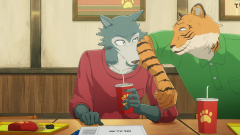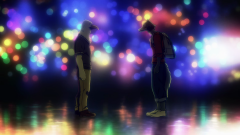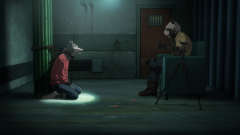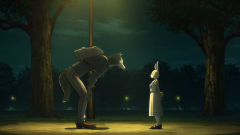This episode marks the beginning of the next chapter after introduction phase in the first five episodes. This week it’s all about expanding its unique settings. Many new players are introduced, most notably Juno, the female underclassmen grey wolf, and Gouhin the Panda, who all make a nice first impression. This week is also the first time we see the outside world, and most significantly, the black market. In addition, the core themes about “being true to their nature” takes a sharp progression in this episode, which forces Legosi to re-access what his feeling is for Haru. It’s a truly knockout episode in every sense.

The news about a herbivore getting assaulted causes another unrest to the community within the school. Here we have an interesting implication of the discrimation between the herbivore and carnivore, those poor carnivores are bullied whenever there’s a tension between these two. “Is it something the need to get used to”, these words hit the chord here. Points for Legosi to go out his way to save Juno, even if it’s awkward, but the pain they share is the same: being called out for their nature, even though they try their best to suppress it. Legosi makes peace with the bullying, the very thing that pisses Louis off. Juno turns out is a member of the drama club as well, so I fully expect a three-way romance (four-way? With Louis also joining the picture) between the main cast. Although this plot thread is far from subtlety, it makes perfect sense. Juno is much more compatible to Legosi than Haru, but even now in this early stage it’s clear where Legosi’s heart goes.
And then the drama club’s carnivore kids go to the big city and it serves as a perfect opportunity for the mangaka-sensei Itagaki to explore the relationship between these two races in the bigger picture. Legosi is quite surprised to see they live in perfect harmony (in truth though, he should’ve known all that as he comes from this very world), but with a condition. As in every metropolis city, there is a slum area to balance out, in this world that place is black market, a place where carnivores can satisfy their own needs. As such, the moment where the old goat offers his own fingers for money is indeed terrifying, in both sense as how it affects and divides Legosi and his friends (Bill is predictably on board), and how it seems natural for the goat himself to offer his parts of the body for money like no big deal (but hey, glad to see that the world humanlike animals still use yen currency). Runaway as fast as he could, Legosi still finds himself tempted by the meat. T’was the curse of being a meat-eating animal. And we can see clearly at the end with his friend Aoba the Eagle how they have to try hard to not consume any meat. The question is how long can they keep that up.

It’s quite inventive of Itagaki the mangaka to come up with this panda character as a cross between carnivore and herbivore: a predator who can live off eating bamboo. He’s the one who picks up poor Legosi and does a therapy to him: basically talk to him to find out his issues. At this point, he serves as a mentor for Legosi, and he himself thinks it’s unnatural for Legosi to have feelings for his near-victim rabbit. Yeah, I understand why he gives Legosi the rabbit porn-mag, find out if he truly has a fetish for cute rabbit (which I suppose is not), or just his fascinating towards Haru, which in turn indicates that it’s just his pure instinct of wanting to consume her (On a related note, it’s beyond me how Gouhin has that porn mag ready in the first place. Have a fetish for cute rabbit too, old man?). There’s certainly a lot to unpack this week, all points towards how carnivores dealing with their own violent nature and how they deal with the pressure from their own society of being “normal”.




